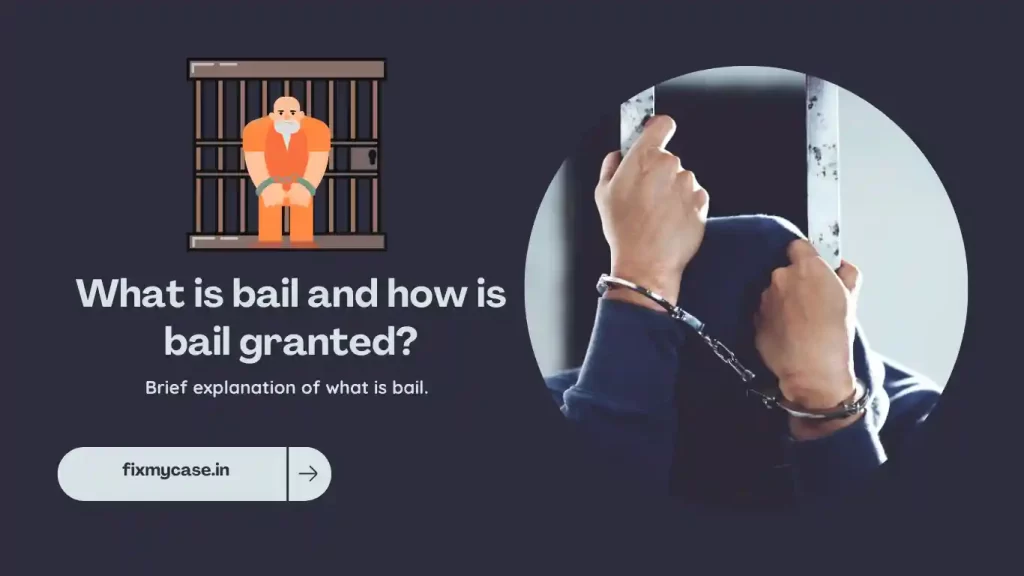Brief explanation of what is bail.
A accused criminal is prosecuted and the police produce them in court and present evidence and evidence in court to prove that they have committed the crime and get the accused convicted.
Such cases are divided into two categories, bailable and non-bailable depending on the crimes committed by the accused.
What is a bailable offence?
Bailable cases are mostly minor offences.
In such crimes, the police officer can release the arrested person on bail. (In certain crimes only) No bail is required.
The police officer can release the person on bail by taking bail from the arrested person.
What is non-bailable offence?
Non-bailable cases are serious crimes punishable by imprisonment for more than two years.
The police officer can only arrest the perpetrators of such crimes but cannot release them on bail.
Therefore, in such cases, the accused should get bail in the appropriate court.
In a non-bailable case, if a person accused by the police asks for bail in the court, the public prosecutor who can argue against him will state the problem in the case and will argue before the court by explaining each reason.
He would argue that the accused should not be granted bail and put forward strong arguments.
If the reasons are correct, the accused person will be denied bail if the court considers that the case will be diverted due to the consequences caused by the accused.

Some of the reasons for denial of bail are:
- If the accused gets bail, the complainant will be in danger.
- More evidence will be destroyed.
- The accused will not be present during the trial.
- He will destroy the witnesses.
- He will commit more crimes after getting bail.
- Police investigation is yet to be completed.
- The stolen items have not yet been recovered.
- The documents used to commit the crime have not yet been seized.
- The co-accused are still absconding.
- Danger to the lives of witnesses.
A multi-layered argument will be made by the prosecution in court to deny bail on such grounds.
The accused’s lawyer must respond to the court denying the prosecution’s allegations.
When filing a bail application in the court, there is such an argument between the lawyers that bail should not be granted, but if the court accepts the petitioner’s assurance that he will never commit the above crimes, then the accused person will get bail.
The lawyer will plead the following reasons on behalf of the accused to get bail.
1. He will lose his job if he does not go on bail.
2. As he is the only earner in the family, his family suffers without income
3. He is not healthy and can only recover if he takes treatment in a private hospital outside.
4. Appeal has been filed. It is against justice to keep a convicted prisoner in jail pending appeal.
Let’s know how bail is granted:
Bail is granted based on court conditions.
If the accused accepts the conditions imposed by the court, he may be out of jail on bail pending the completion of the trial.
If the accused is found innocent at the trial, the accused will be permanently acquitted.
What are the bail conditions?
In order to bail the accused, if it is a minor offence, two persons possessing immovable property worth Rs.50,000/- should be surety.
On the specified date, the sureties must go to the court with the original family card.
What are the questions asked of sureties, and the bail procedure?
- The judge will ask the bailiffs how do you know the accused?
- What is the name of the accused?
- What is the name of the accused’s father?
- In which city does the accused live?
- What is the name of the wife of the accused?
- What crime has the accused committed?
- what is your name?
- What is your father’s name?
- In which town is your property located?
- What are your assets worth?
The judge will ask many such questions to the sureties and the sureties must give appropriate answers to them.
The judge will also inform the bailiffs that if the accused does not appear in court or at the police station as per the specified conditions, you will be arrested.
Then bail will be issued by putting the court seal on the family card of the sureties.
Refusal of bail and appeal If a judge refuses to grant bail to an accused, he must state the reasons therefor in his judgment, Only then can the accused appeal to the High Court.
One’s petition may be dismissed but may be re-petitioned after some time in the same court or may be appealed to the High Court.
